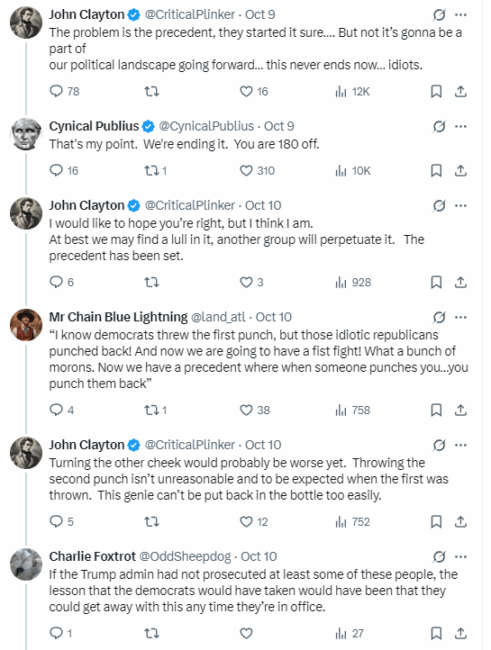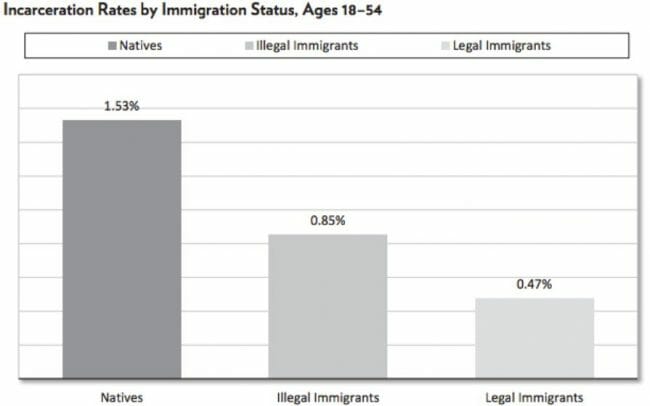The Path to a Banana Republic
I don't know who this is, but this X post by Cynical Publius has been quoted by a number of Conservative sites. This represents a VERY common attitude among Conservatives and deserves to be quoted in depth. In regards to the prosecution of Letitia James he writes:
You see, for many years now Democrats have believed that they could do basically whatever they wanted to Republicans, whilst Republicans were still bound by the Old Rules of comity and respect.
Those were the New Rules. (Hat tip, Kurt Schlichter.). They thought we would never adopt the New Rules.
We did.
The James indictment says to Democrats: “You no longer can assume that we will let you do whatever you want to us. We will do to you what you did to us. And we will be merciless until you prove you will never do it again.”
The particular beauty of the James indictment is that she brought the most scurrilous and ridiculous of charges against Trump, while the record shows that James clearly committed the basic federal crimes she has been charged with.
Here’s the other thing. Federal laws are so complex and capacious that pretty much every one of us breaks a federal law every few months without knowing that we did. There has long been a tacit understanding in this regard that politicians would not take advantage of this with regard to mere “footfaults” on nonsense laws. But Democrats decide to abandon that too. New Rules. That we now follow. Suck on it, Democrats. You get what you paid for.
(But to repeat; James charged Trump with nonsense; Trump charged James with a verifiable crime.)
That last part is likely true, though it is not clear that very many people are prosecuted for it. It is certainly NOT true for the Comey prosecution, which as currently charged is a total crock [update: this is not to say that Comey is guilty of abuse of power charges -- it is simply to say that the current charges are cr*p].
Whatever the case, Mr. Publius appears to be working from the assumption that getting tough on the Left with actions like this is the only way to de-escalate all the lawfare -- I suppose the logic being that bullies back down when challenged and forced to face accountability. This is clearer in some of the comments to the post:
This is the FAFO (f*ck around, find out) stance being taken by many Republicans, reflecting the decision-making rules of playground and bar fights. But for all that we overuse fight analogies when referring to politics, the correct behaviors in a Constitutional Republic which emphasizes the rule of law are different than in a bar fight. Precedents really do matter, and even more so precedents that are repeated and reinforced by the political opposition get set in stone. Mr. Publius is correct in saying that any person is likely guilty of something given the web of detailed, illogical, and self-contradictory Federal and state laws and regulations. That is all the more reason to avoid degenerating into tit for tat lawfare as this legal environment makes lawfare all too easy -- against most anyone. Our out of control regulatory state creates an environment like a dry overgrown southern California ravine on a hot day during a drought. The Biden administration started some fires but ultimately they were contained -- Republicans should remember that despite everything (maybe because of all the lawfare end the sympathy and anger it engendered) their guy was elected. The response now should be to exercise great care until the fire danger is reduced. Instead, Republicans want to whip out the flamethrower.
I get called a simp or a cuck or worse for wishing turn back the clock on lawfare. But historically we revere people who did just that. The best examples of this occurring are from the early history of the US, such as in the election of 1800 when Jefferson just edged out Aaron Burr in a contentious election. I am sure the Federalists were mighty pissed at Mr. Jefferson -- hell, their anger still resonates today in an extremely popular modern Broadway musical -- but they honorably turned over power to their hated rival. Looking farther back into history, Mr. Publius has adopted a nom de plume presumably from on interest in Roman civilization, or at least in how our founders admired the Roman republic. But he needs to go back and re-study how the Roman republic died, a victim of 150 years of steadily escalating precedents that eroded the norms of the old republic. I suggested in the online comments he might want to change his online name to "Graccus" to acknowledge the similar path he is pointing towards in this country.
Or perhaps even better historical examples are the famous blood feuds like between the Hatfields and the McCoys. At what point in this feud do you think that retaliation and escalation by one party "taught the other a lesson" or caused the other to back down and de-escalate? Never, which is why such feuds ended only when everyone was dead.
But an even better way to refute this Mr. Publius's position is to, for a moment, accept the author's premises about the Democrats. There is an old political joke that goes like this:
This is sort of funny, but there is actually a better meta joke associated with this I will come back to in the postscript. But I think we can confidently ascribe this position to the author Publius and to many other Republicans. They are convinced that the Democrats are evil and that Republicans are well-intended but stupid because they always let Democrats get away with everything and are always to civilized to really fight back. Just read the comment thread above.
But let's assume this is true for the moment. If the Democrats are really always historically evil and law-breaking, what the hell makes one think that being more bare-knuckled is going to change them? If they are evil, are you really expecting them to say "hey, you got me, we went too far, let's dial it back" or are they just going to respond by going to 11 the next time? The author's strategy fails based on his own assumptions. Unless his strategy is to turn the US into a banana republic.
Postscript: The meta joke embedded in the joke quoted above is that believing this statement is one of the few bipartisan political beliefs that exist. Republicans and Democrats BOTH will agree to this statement with a smile ... with the one small difference that Democrats will assume it was written by one of their own and thus that Republicans are the evil party and Democrats are the stupid party that play the game too genteelly. And both the Republican and the Democrat presented with this passage would be shocked and outraged that their opposition would believe its the other way around.
Which brings us back to the case in question. Let's generalize the last line in the Publius post above as "the charges against our guy were a politically-motivated crock, while our charges against their guy are just and fair." Both R's and D's believe this absolutely from their perspective right now. Their lawfare is righteous, the other guy's is evil. So how is escalation of the lawfare going to achieve anything except a degeneration into banana republic politics?
Postscript #2: I am not a Republican so I am probably not an appropriate source of advice to them. But the Republican opportunity in my mind is to drive a wedge between mainstream traditional Democrats and the increasingly crazy, sometimes violent far-Left progressives. This is something Trump seems pretty good at, when he can avoid chasing some new squirrel. But I can tell you that one thing mainstream traditional Diane-Rehm-listening Democrats are NOT going to like is anything that feels like undermining the rule of law. Republican bare-knuckle lawfare is not going to sit well, and is going to drive them into the arms of the crazies, no matter whether the Republicans think Democrats "started it" or not. Republicans are actually winning the PR battle on the shutdown (first time in my whole life that has happened) and Trump has been pretty good at painting Democrats into defending extreme positions on 80-20 issues. Taking immigration as an example -- where I am a strong supporter of increasing immigration limits so this is frustrating to me -- Progressives have made the whole immigration cause about protecting a few named, obvious felons from deportation. And thus losing the PR battle.
Against this backdrop of Progressive own-goals, arresting violent rioters and serial felons will likely get grudging approval even among some Democrats; putting Comey in jail for contempt of Congress is only going to feel good to Republicans and can do nothing but hurt their popularity in the middle.



